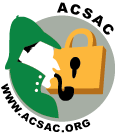Call for Participation
ACSAC is an internationally recognized forum where practitioners, researchers, and developers in information system security meet to learn and to exchange practical ideas and experiences.
If you are developing practical solutions to problems relating to protecting commercial enterprises' or countries' information infrastructures, consider submitting your work to the Annual Computer Security Applications Conference.
We are soliciting submissions in a number of different categories:
• Technical Track: peer-reviewed papers • Panels: proposals for interactive panels • Case Studies: practical experience reports from applying security • Posters: new and innovative preliminary work • Tutorials: in depth seminars on current security topics • Workshop: on up to date hot topics • Works in Progress: works in progress, not yet ready for publishing
We are especially interested in submissions that address the
application of security technology, the implementation of systems, and
lessons learned. Some example topics are:
|
|
Important submission information:
Submission
DeadlineAcceptance
NotificationTutorials June 1 June 14, 2010 July 20, 2010 Technical Track June 14 June 22, 2010 August 16, 2010 Panels June 14, 2010 August 16, 2010 Workshop June 14, 2010 July 20, 2010 Case Studies June 14, 2010 August 16, 2010 Posters September 17, 2010 September 30, 2010 Works in Progress September 17, 2010 September 30, 2010
Technical Track Paper Submissions (contact Program Chair)
- Michael Franz, University of California, Irvine (Program Chair)
- John McDermott, Naval Research Lab (Program Co-Chair)
Panels (contact Panels Chair)
- Hongxia Jin, IBM (Panels Chair)
Case Studies in Applied Security (contact Case Studies Chair)
- Steven Rome, Booz Allen Hamilton (Case Studies Chair)
Posters (Contact Poster Chair)
- Benjamin Kuperman, Oberlin College (Posters Chair)
Tutorials (contact Tutorials Chair)
- Daniel Faigin, The Aerospace Corporation, USA. (Tutorials Chair)
Workshop (Contact Workshops Chair)
- Harvey Rubinovitz, The MITRE Corporation (Workshop Chair)
Works In Progress (Contact WIP Chair)
- Charlie Payne, Adventium Labs (WiP Chair)
Exhibitors & Sponsors
Again this year we will offer attendees access to exhibits and displays of products and services related to the conference topics. For information on exhibiting at this year's conference contact exhibit@acsac.org.
Conferenceship Program
ACSAC offers a conferenceship program to enable students to attend the Annual Computer Security Applications Conference. This program will pay for the conference and tutorial expenses, including travel, for selected students. Additional information about this program is available on the Student Awards page.
Future Updates:
To be added to the Annual Computer Security Applications Conference Mailing List, click here.
ACSAC does not accept "speaking proposals" per se, however; you are encouraged to submit suggestions in the form of a one paragraph description of a topic and a biography of the proposed presenter. Depending on a proposal's technical content, it may be acceptable as a case study. If a full paper is available, it may be acceptable as a technical paper. If a presentation by a group of related speakers is contemplated, a proposal for this session may be acceptable as a panel or forum. If a proposal for a half day or full day seminar is appropriate, it may be acceptable as a tutorial. If a one or two page technical writeup is available that describes work that is not yet completed, it may be acceptable as a poster. Finally, if your have an interest in a full day interactive dialogue, exchanging ideas, opinions and concerns between multiple presenters and attendees, consider being a workshop presenter.
For More Information
- For general conference information, see the menu at left
- For refereed papers information: see our paper submission page
- For case studies information: see our case studies page
- For publicity information: contact the Publicity Chair
- For student paper/award information: see our student awards page
- For tutorial information: see our tutorial page
- For posters information: see our posters page
- For works in progress information: see our works in progress page
- For the issues workshop: see our issues workshop page
About the Sponsor
Applied Computer Security Associates (ACSA) had its genesis in the first Aerospace Computer Security Applications Conference in 1985. That conference was a success and evolved into the Annual Computer Security Applications Conference (ACSAC). Several years ago the word "Aerospace" was dropped from the name to promote a wider range of government and commercial applications. ACSA was incorporated in 1987 as a non-profit association of computer security professionals who have a common goal of improving the understanding, theory, and practice of computer security. ACSA continues to be the primary sponsor of the annual conference.
In 1989, ACSA began the Distinguished Lecture Series at the annual conference. Each year, an outstanding computer security professional is invited to present a lecture of current topical interest to the security community. In 1991, ACSA began a Best-Paper by a Student Award, presented at the Annual conference. This award is intended to encourage active student participation in the annual conference. The award winning student author receives an honorarium and all expenses to the conference.
ACSA continues to be committed to serving the security community by finding additional approaches for encouraging and facilitating dialogue and technical interchange. ACSA is always interested in suggestions from interested professionals and computer security professional organizations on how to achieve these goals.




